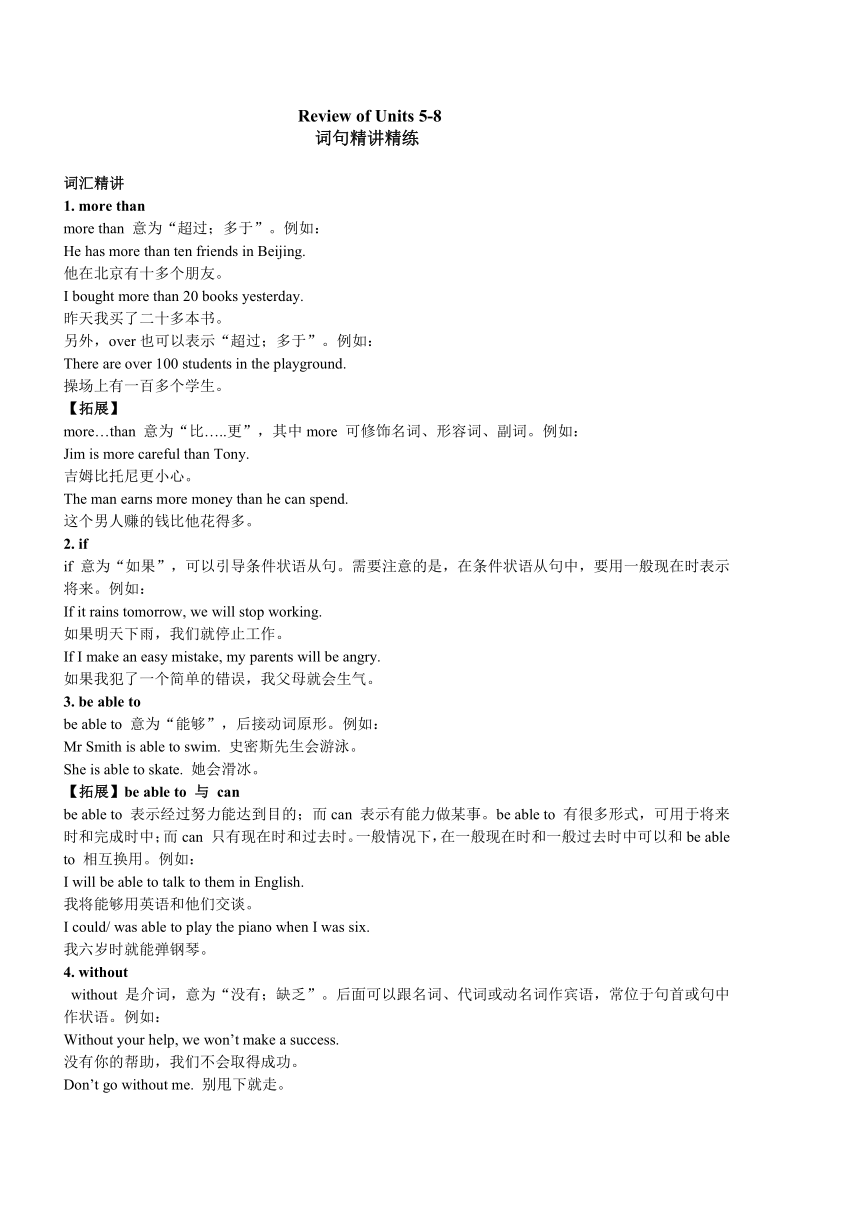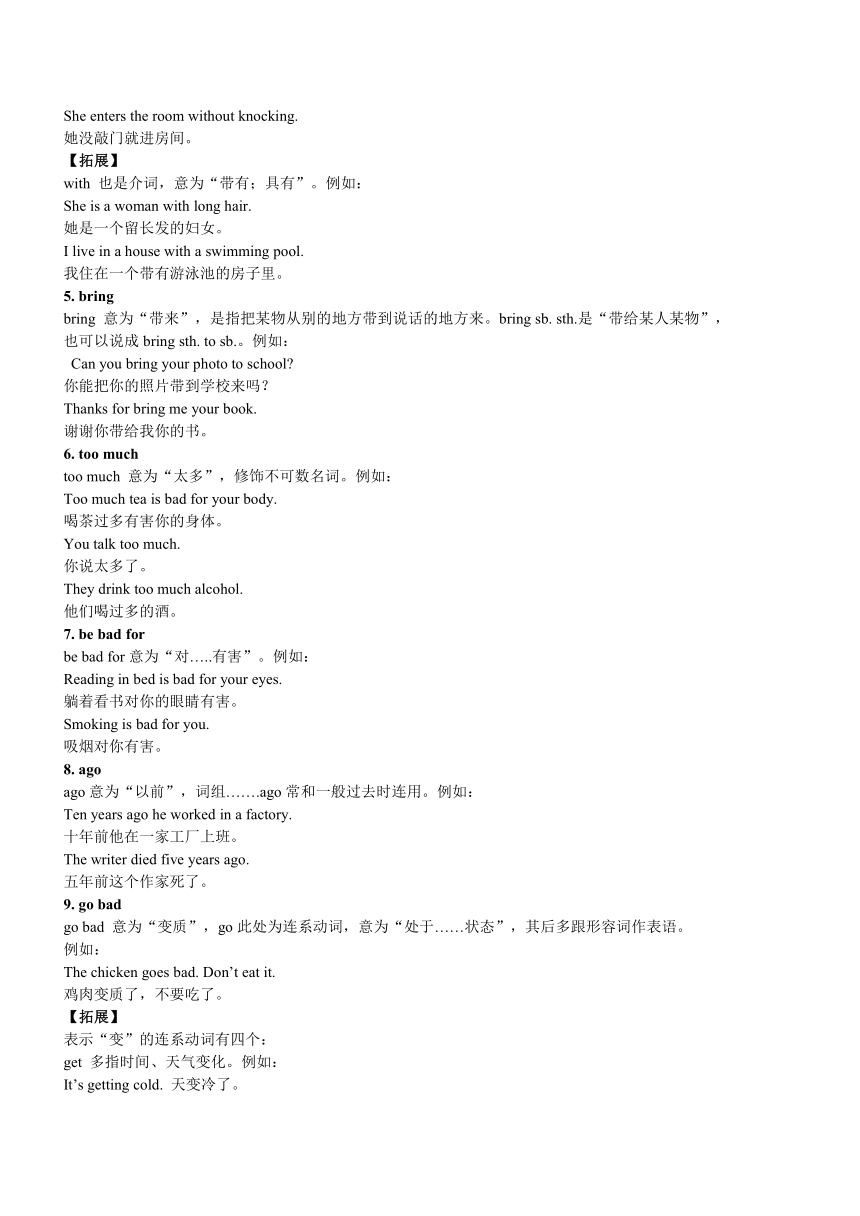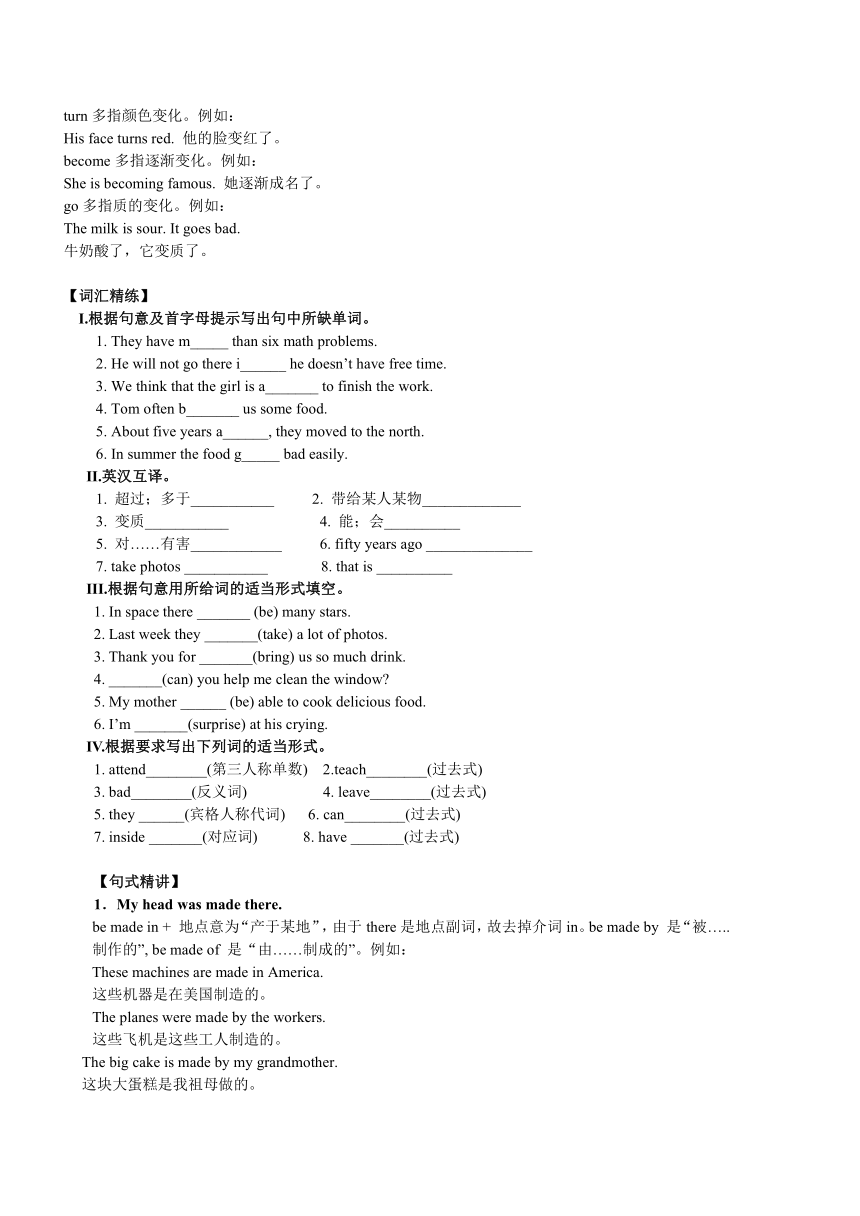牛津深圳版七年级上册review of units 5-8 词句精讲级练习(含答案)
文档属性
| 名称 | 牛津深圳版七年级上册review of units 5-8 词句精讲级练习(含答案) |  | |
| 格式 | zip | ||
| 文件大小 | 57.5KB | ||
| 资源类型 | 教案 | ||
| 版本资源 | 牛津深圳版 | ||
| 科目 | 英语 | ||
| 更新时间 | 2022-11-29 17:23:52 | ||
图片预览



文档简介
Review of Units 5-8
词句精讲精练
词汇精讲
1. more than
more than 意为“超过;多于”。例如:
He has more than ten friends in Beijing.
他在北京有十多个朋友。
I bought more than 20 books yesterday.
昨天我买了二十多本书。
另外,over也可以表示“超过;多于”。例如:
There are over 100 students in the playground.
操场上有一百多个学生。
【拓展】
more…than 意为“比…..更”,其中more 可修饰名词、形容词、副词。例如:
Jim is more careful than Tony.
吉姆比托尼更小心。
The man earns more money than he can spend.
这个男人赚的钱比他花得多。
2. if
if 意为“如果”,可以引导条件状语从句。需要注意的是,在条件状语从句中,要用一般现在时表示将来。例如:
If it rains tomorrow, we will stop working.
如果明天下雨,我们就停止工作。
If I make an easy mistake, my parents will be angry.
如果我犯了一个简单的错误,我父母就会生气。
3. be able to
be able to 意为“能够”,后接动词原形。例如:
Mr Smith is able to swim. 史密斯先生会游泳。
She is able to skate. 她会滑冰。
【拓展】be able to 与 can
be able to 表示经过努力能达到目的;而can 表示有能力做某事。be able to 有很多形式,可用于将来时和完成时中;而can 只有现在时和过去时。一般情况下,在一般现在时和一般过去时中可以和be able to 相互换用。例如:
I will be able to talk to them in English.
我将能够用英语和他们交谈。
I could/ was able to play the piano when I was six.
我六岁时就能弹钢琴。
4. without
without 是介词,意为“没有;缺乏”。后面可以跟名词、代词或动名词作宾语,常位于句首或句中作状语。例如:
Without your help, we won’t make a success.
没有你的帮助,我们不会取得成功。
Don’t go without me. 别甩下就走。
She enters the room without knocking.
她没敲门就进房间。
【拓展】
with 也是介词,意为“带有;具有”。例如:
She is a woman with long hair.
她是一个留长发的妇女。
I live in a house with a swimming pool.
我住在一个带有游泳池的房子里。
5. bring
bring 意为“带来”,是指把某物从别的地方带到说话的地方来。bring sb. sth.是“带给某人某物”,也可以说成bring sth. to sb.。例如:
Can you bring your photo to school
你能把你的照片带到学校来吗?
Thanks for bring me your book.
谢谢你带给我你的书。
6. too much
too much 意为“太多”,修饰不可数名词。例如:
Too much tea is bad for your body.
喝茶过多有害你的身体。
You talk too much.
你说太多了。
They drink too much alcohol.
他们喝过多的酒。
7. be bad for
be bad for意为“对…..有害”。例如:
Reading in bed is bad for your eyes.
躺着看书对你的眼睛有害。
Smoking is bad for you.
吸烟对你有害。
8. ago
ago意为“以前”,词组…….ago常和一般过去时连用。例如:
Ten years ago he worked in a factory.
十年前他在一家工厂上班。
The writer died five years ago.
五年前这个作家死了。
9. go bad
go bad 意为“变质”,go此处为连系动词,意为“处于……状态”,其后多跟形容词作表语。
例如:
The chicken goes bad. Don’t eat it.
鸡肉变质了,不要吃了。
【拓展】
表示“变”的连系动词有四个:
get 多指时间、天气变化。例如:
It’s getting cold. 天变冷了。
turn多指颜色变化。例如:
His face turns red. 他的脸变红了。
become多指逐渐变化。例如:
She is becoming famous. 她逐渐成名了。
go多指质的变化。例如:
The milk is sour. It goes bad.
牛奶酸了,它变质了。
【词汇精练】
I.根据句意及首字母提示写出句中所缺单词。
1. They have m_____ than six math problems.
2. He will not go there i______ he doesn’t have free time.
3. We think that the girl is a_______ to finish the work.
4. Tom often b_______ us some food.
5. About five years a______, they moved to the north.
6. In summer the food g_____ bad easily.
II.英汉互译。
1. 超过;多于___________ 2. 带给某人某物_____________
3. 变质___________ 4. 能;会__________
5. 对……有害____________ 6. fifty years ago ______________
7. take photos ___________ 8. that is __________
III.根据句意用所给词的适当形式填空。
1. In space there _______ (be) many stars.
2. Last week they _______(take) a lot of photos.
3. Thank you for _______(bring) us so much drink.
4. _______(can) you help me clean the window
5. My mother ______ (be) able to cook delicious food.
6. I’m _______(surprise) at his crying.
IV.根据要求写出下列词的适当形式。
1. attend________(第三人称单数) 2.teach________(过去式)
3. bad________(反义词) 4. leave________(过去式)
5. they ______(宾格人称代词) 6. can________(过去式)
7. inside _______(对应词) 8. have _______(过去式)
【句式精讲】
1.My head was made there.
be made in + 地点意为“产于某地”,由于there是地点副词,故去掉介词in。be made by 是“被…..制作的”, be made of 是“由……制成的”。例如:
These machines are made in America.
这些机器是在美国制造的。
The planes were made by the workers.
这些飞机是这些工人制造的。
The big cake is made by my grandmother.
这块大蛋糕是我祖母做的。
The table is made of wood. 这张桌子是木质的。
2. If you enjoy history and natural beauty, you will love this garden.
enjoy是“享受….乐趣”, enjoy doing是固定结构,意为“享受做某事的乐趣”。enjoy oneself 意为“过得愉快”,例如:
His grandfather enjoys listening to Beijing Opera.
他爷爷很享受听京剧的乐趣。
We used to enjoy playing the violin.
我们过去很喜欢拉小提琴。
【拓展】
have a good time 意思是“过得愉快”、“玩得高兴”。have fun in doing sth. 意思是“在做某事方面有乐趣”。例如:
When I was young, I had a good time on weekends.
我小的时候,周末过得很愉快。
Why did they have a good time yesterday
他们昨天为什么过得不快乐?
The boys have fun in playing computer games.
这些男孩在玩电脑游戏方面有乐趣。
3.The night before, I was so excited that I could not sleep.
so…..that…… 意为“如此……以至于……”, so 是副词,后接形容词或副词,that 引导结果状语从句。
He is so tall that he can catch the apple on the tree.
他是那么高以至于他能够得着树上的苹果。
She speaks so fast that we can’t follow her.
她说得那么快以至于我们跟不上她。
【拓展】
so that 意思是“为了”,引导目的状语从句,相当于in order that。例如:
We get up early so that we can catch the early bus.
为了能赶上早班车,我们起得很早。
4. …look them up in the dictionary.
look up 意为“(在词典或参考书中)查阅,检查”,其后跟名词作宾语,名词可放在look和up之间,也可放在look up 之后;如果代词作宾语,则只能放在look和up之间。例如:
Please look up the answer to the question in the book.
请在书中查一下这个问题的答案。
If you don’t know how to read the word, you can look it up in the dictionary.
如果你不知道如何读这个单词,你可以在词典中查一下。
【拓展】
look for 意思是“寻找”,强调寻找的过程。而find意思是“找到;发现”,指寻找的结果。例如:
—What are you doing 你正在干什么?
— I’m looking for my key. 我正在找我的钥匙。
Because I didn’t find my pen, I was very sad.
因为我没找到我的钢笔,所以我很伤心。
5.Daniel was the first student to speak.
first 意思是“第一”,是序数词,像second第二,third 第三, fourth 第四,fifth 第五等都是序数词;像one一, two 二,three 三,four四, five 五等都是基数词。
【拓展】
英语中序数词前一般都要加定冠词the。例如:
Please sing the first song together.
请一起唱第一首歌。
【句式精练】
I. 连词成句。
at, the, spaceship, 9, a.m., will, the, leave, Earth
____________________________________________
a, money, trip, of, to, lot, a, the, Moon, cost, will
_____________________________________________
I, to, do, do, not, know, homework, what
_____________________________________________
yesterday, I, school, had, an, at, exciting, time
_____________________________________________
II. 根据要求变换句式。
1.You can find a list of the sites on the Internet.(变否定句)
You_______ ______ a list of the sites on the Internet.
2.The visitors will visit West Lake.(改为一般疑问句)
_________the visitors _________West Lake
3.They built a new school in the centre of the city. (改为一般疑问句)
______ they ______ a new school in the centre of the city
4.In summer vacation we took a plane to Shanghai.(同义句)
In summer vacation we __________ __________ Shanghai.
5.She often gets up at six o’clock.(用tomorrow改写)
She __________ __________ up at six o’clock tomorrow.
III. 根据汉语提示,完成句子。
—上周末你们去哪儿了?
—我们去西湖了。
—______ _______ you go last weekend
—We ______ ______ West Lake.
2. 我妹妹那么小不能去上学。
My sister is _____ young ______ she can’t go to school.
3. 她的杯子是玻璃制的。
_____ cup is ______ of glass.
4. 老师找不到他的词典了。
The teacher ______ ______ his dictionary.
5. 今天上午我们玩得很愉快。
We ______ _______ this morning.
6. 王老师是第一个来学校的人。
Mr Wang is _____ ______ to come to school.
IV. 对句子的划线部分提问。
1.Last week they attended the Clubs Fair.
_______ did they ______ the Clubs Fair
2. Lily took a toy from the table.
________ _______ a toy from the table
3. He felt very excited because he was the first.
_____ did he ______ very excited
4. She wanted to go home.
_____ ______ she ______ to do
5. These are the children’s toys.
______ ______ are these
V. 选词填空。
从方框内所给词的适当形式填空。每个词只能用一次。
have, relax, tomato, she, nine
1.September is the ______month of the year(年).
2.She __________P.E. on Thursday every week.
3.How much are the__________ .
4. Mary lost ____keys in the classroom.
5. I like listening to music. It’s ____.
【词汇精练-参考答案】
I.根据句意及首字母提示写出句中所缺单词。
1.more 2. if 3. able 4. brings 5. ago 6. goes
II.英汉互译。
1. more than 2. bring sb. sth. 3. go bad 4. be able to
5. be bad for 6. 五十年前 7. 拍照 8. 也就是说;即
III.根据句意用所给词的适当形式填空。
1.are 2. took 3. bringing 4. Can 5. is 6. surprised
IV.根据要求写出下列词的相应形式。
1. attends 2. taught 3. good 4. left
5. them 6. could 7. outside 8. had
【句型精练-参考答案】
I. 连词成句。
1. The spaceship will leave the Earth at 9 a.m.
2. A trip to the Moon will cost a lot of money.
3. I do not know what homework to do.
4. I had an exciting time at school yesterday.
II.根据要求变换句式。
1. can, not 2. Will, visit 3. Did, build 4. flied, to
5. will, get
III. 根据汉语提示,完成句子。
1. Where, did; went to 2. so; that 3. Her, made 4. can’t, find
5. enjoyed, ourselves 6. the, first
IV. 对句子的划线部分提问。
1. When, attend 2. Who, took 3. Why, did
4. What, did, want 5. Whose, toys
V.选词填空。
1. ninth 2.has 3.tomatoes 4.her 5. relaxing
PAGE
词句精讲精练
词汇精讲
1. more than
more than 意为“超过;多于”。例如:
He has more than ten friends in Beijing.
他在北京有十多个朋友。
I bought more than 20 books yesterday.
昨天我买了二十多本书。
另外,over也可以表示“超过;多于”。例如:
There are over 100 students in the playground.
操场上有一百多个学生。
【拓展】
more…than 意为“比…..更”,其中more 可修饰名词、形容词、副词。例如:
Jim is more careful than Tony.
吉姆比托尼更小心。
The man earns more money than he can spend.
这个男人赚的钱比他花得多。
2. if
if 意为“如果”,可以引导条件状语从句。需要注意的是,在条件状语从句中,要用一般现在时表示将来。例如:
If it rains tomorrow, we will stop working.
如果明天下雨,我们就停止工作。
If I make an easy mistake, my parents will be angry.
如果我犯了一个简单的错误,我父母就会生气。
3. be able to
be able to 意为“能够”,后接动词原形。例如:
Mr Smith is able to swim. 史密斯先生会游泳。
She is able to skate. 她会滑冰。
【拓展】be able to 与 can
be able to 表示经过努力能达到目的;而can 表示有能力做某事。be able to 有很多形式,可用于将来时和完成时中;而can 只有现在时和过去时。一般情况下,在一般现在时和一般过去时中可以和be able to 相互换用。例如:
I will be able to talk to them in English.
我将能够用英语和他们交谈。
I could/ was able to play the piano when I was six.
我六岁时就能弹钢琴。
4. without
without 是介词,意为“没有;缺乏”。后面可以跟名词、代词或动名词作宾语,常位于句首或句中作状语。例如:
Without your help, we won’t make a success.
没有你的帮助,我们不会取得成功。
Don’t go without me. 别甩下就走。
She enters the room without knocking.
她没敲门就进房间。
【拓展】
with 也是介词,意为“带有;具有”。例如:
She is a woman with long hair.
她是一个留长发的妇女。
I live in a house with a swimming pool.
我住在一个带有游泳池的房子里。
5. bring
bring 意为“带来”,是指把某物从别的地方带到说话的地方来。bring sb. sth.是“带给某人某物”,也可以说成bring sth. to sb.。例如:
Can you bring your photo to school
你能把你的照片带到学校来吗?
Thanks for bring me your book.
谢谢你带给我你的书。
6. too much
too much 意为“太多”,修饰不可数名词。例如:
Too much tea is bad for your body.
喝茶过多有害你的身体。
You talk too much.
你说太多了。
They drink too much alcohol.
他们喝过多的酒。
7. be bad for
be bad for意为“对…..有害”。例如:
Reading in bed is bad for your eyes.
躺着看书对你的眼睛有害。
Smoking is bad for you.
吸烟对你有害。
8. ago
ago意为“以前”,词组…….ago常和一般过去时连用。例如:
Ten years ago he worked in a factory.
十年前他在一家工厂上班。
The writer died five years ago.
五年前这个作家死了。
9. go bad
go bad 意为“变质”,go此处为连系动词,意为“处于……状态”,其后多跟形容词作表语。
例如:
The chicken goes bad. Don’t eat it.
鸡肉变质了,不要吃了。
【拓展】
表示“变”的连系动词有四个:
get 多指时间、天气变化。例如:
It’s getting cold. 天变冷了。
turn多指颜色变化。例如:
His face turns red. 他的脸变红了。
become多指逐渐变化。例如:
She is becoming famous. 她逐渐成名了。
go多指质的变化。例如:
The milk is sour. It goes bad.
牛奶酸了,它变质了。
【词汇精练】
I.根据句意及首字母提示写出句中所缺单词。
1. They have m_____ than six math problems.
2. He will not go there i______ he doesn’t have free time.
3. We think that the girl is a_______ to finish the work.
4. Tom often b_______ us some food.
5. About five years a______, they moved to the north.
6. In summer the food g_____ bad easily.
II.英汉互译。
1. 超过;多于___________ 2. 带给某人某物_____________
3. 变质___________ 4. 能;会__________
5. 对……有害____________ 6. fifty years ago ______________
7. take photos ___________ 8. that is __________
III.根据句意用所给词的适当形式填空。
1. In space there _______ (be) many stars.
2. Last week they _______(take) a lot of photos.
3. Thank you for _______(bring) us so much drink.
4. _______(can) you help me clean the window
5. My mother ______ (be) able to cook delicious food.
6. I’m _______(surprise) at his crying.
IV.根据要求写出下列词的适当形式。
1. attend________(第三人称单数) 2.teach________(过去式)
3. bad________(反义词) 4. leave________(过去式)
5. they ______(宾格人称代词) 6. can________(过去式)
7. inside _______(对应词) 8. have _______(过去式)
【句式精讲】
1.My head was made there.
be made in + 地点意为“产于某地”,由于there是地点副词,故去掉介词in。be made by 是“被…..制作的”, be made of 是“由……制成的”。例如:
These machines are made in America.
这些机器是在美国制造的。
The planes were made by the workers.
这些飞机是这些工人制造的。
The big cake is made by my grandmother.
这块大蛋糕是我祖母做的。
The table is made of wood. 这张桌子是木质的。
2. If you enjoy history and natural beauty, you will love this garden.
enjoy是“享受….乐趣”, enjoy doing是固定结构,意为“享受做某事的乐趣”。enjoy oneself 意为“过得愉快”,例如:
His grandfather enjoys listening to Beijing Opera.
他爷爷很享受听京剧的乐趣。
We used to enjoy playing the violin.
我们过去很喜欢拉小提琴。
【拓展】
have a good time 意思是“过得愉快”、“玩得高兴”。have fun in doing sth. 意思是“在做某事方面有乐趣”。例如:
When I was young, I had a good time on weekends.
我小的时候,周末过得很愉快。
Why did they have a good time yesterday
他们昨天为什么过得不快乐?
The boys have fun in playing computer games.
这些男孩在玩电脑游戏方面有乐趣。
3.The night before, I was so excited that I could not sleep.
so…..that…… 意为“如此……以至于……”, so 是副词,后接形容词或副词,that 引导结果状语从句。
He is so tall that he can catch the apple on the tree.
他是那么高以至于他能够得着树上的苹果。
She speaks so fast that we can’t follow her.
她说得那么快以至于我们跟不上她。
【拓展】
so that 意思是“为了”,引导目的状语从句,相当于in order that。例如:
We get up early so that we can catch the early bus.
为了能赶上早班车,我们起得很早。
4. …look them up in the dictionary.
look up 意为“(在词典或参考书中)查阅,检查”,其后跟名词作宾语,名词可放在look和up之间,也可放在look up 之后;如果代词作宾语,则只能放在look和up之间。例如:
Please look up the answer to the question in the book.
请在书中查一下这个问题的答案。
If you don’t know how to read the word, you can look it up in the dictionary.
如果你不知道如何读这个单词,你可以在词典中查一下。
【拓展】
look for 意思是“寻找”,强调寻找的过程。而find意思是“找到;发现”,指寻找的结果。例如:
—What are you doing 你正在干什么?
— I’m looking for my key. 我正在找我的钥匙。
Because I didn’t find my pen, I was very sad.
因为我没找到我的钢笔,所以我很伤心。
5.Daniel was the first student to speak.
first 意思是“第一”,是序数词,像second第二,third 第三, fourth 第四,fifth 第五等都是序数词;像one一, two 二,three 三,four四, five 五等都是基数词。
【拓展】
英语中序数词前一般都要加定冠词the。例如:
Please sing the first song together.
请一起唱第一首歌。
【句式精练】
I. 连词成句。
at, the, spaceship, 9, a.m., will, the, leave, Earth
____________________________________________
a, money, trip, of, to, lot, a, the, Moon, cost, will
_____________________________________________
I, to, do, do, not, know, homework, what
_____________________________________________
yesterday, I, school, had, an, at, exciting, time
_____________________________________________
II. 根据要求变换句式。
1.You can find a list of the sites on the Internet.(变否定句)
You_______ ______ a list of the sites on the Internet.
2.The visitors will visit West Lake.(改为一般疑问句)
_________the visitors _________West Lake
3.They built a new school in the centre of the city. (改为一般疑问句)
______ they ______ a new school in the centre of the city
4.In summer vacation we took a plane to Shanghai.(同义句)
In summer vacation we __________ __________ Shanghai.
5.She often gets up at six o’clock.(用tomorrow改写)
She __________ __________ up at six o’clock tomorrow.
III. 根据汉语提示,完成句子。
—上周末你们去哪儿了?
—我们去西湖了。
—______ _______ you go last weekend
—We ______ ______ West Lake.
2. 我妹妹那么小不能去上学。
My sister is _____ young ______ she can’t go to school.
3. 她的杯子是玻璃制的。
_____ cup is ______ of glass.
4. 老师找不到他的词典了。
The teacher ______ ______ his dictionary.
5. 今天上午我们玩得很愉快。
We ______ _______ this morning.
6. 王老师是第一个来学校的人。
Mr Wang is _____ ______ to come to school.
IV. 对句子的划线部分提问。
1.Last week they attended the Clubs Fair.
_______ did they ______ the Clubs Fair
2. Lily took a toy from the table.
________ _______ a toy from the table
3. He felt very excited because he was the first.
_____ did he ______ very excited
4. She wanted to go home.
_____ ______ she ______ to do
5. These are the children’s toys.
______ ______ are these
V. 选词填空。
从方框内所给词的适当形式填空。每个词只能用一次。
have, relax, tomato, she, nine
1.September is the ______month of the year(年).
2.She __________P.E. on Thursday every week.
3.How much are the__________ .
4. Mary lost ____keys in the classroom.
5. I like listening to music. It’s ____.
【词汇精练-参考答案】
I.根据句意及首字母提示写出句中所缺单词。
1.more 2. if 3. able 4. brings 5. ago 6. goes
II.英汉互译。
1. more than 2. bring sb. sth. 3. go bad 4. be able to
5. be bad for 6. 五十年前 7. 拍照 8. 也就是说;即
III.根据句意用所给词的适当形式填空。
1.are 2. took 3. bringing 4. Can 5. is 6. surprised
IV.根据要求写出下列词的相应形式。
1. attends 2. taught 3. good 4. left
5. them 6. could 7. outside 8. had
【句型精练-参考答案】
I. 连词成句。
1. The spaceship will leave the Earth at 9 a.m.
2. A trip to the Moon will cost a lot of money.
3. I do not know what homework to do.
4. I had an exciting time at school yesterday.
II.根据要求变换句式。
1. can, not 2. Will, visit 3. Did, build 4. flied, to
5. will, get
III. 根据汉语提示,完成句子。
1. Where, did; went to 2. so; that 3. Her, made 4. can’t, find
5. enjoyed, ourselves 6. the, first
IV. 对句子的划线部分提问。
1. When, attend 2. Who, took 3. Why, did
4. What, did, want 5. Whose, toys
V.选词填空。
1. ninth 2.has 3.tomatoes 4.her 5. relaxing
PAGE
同课章节目录
